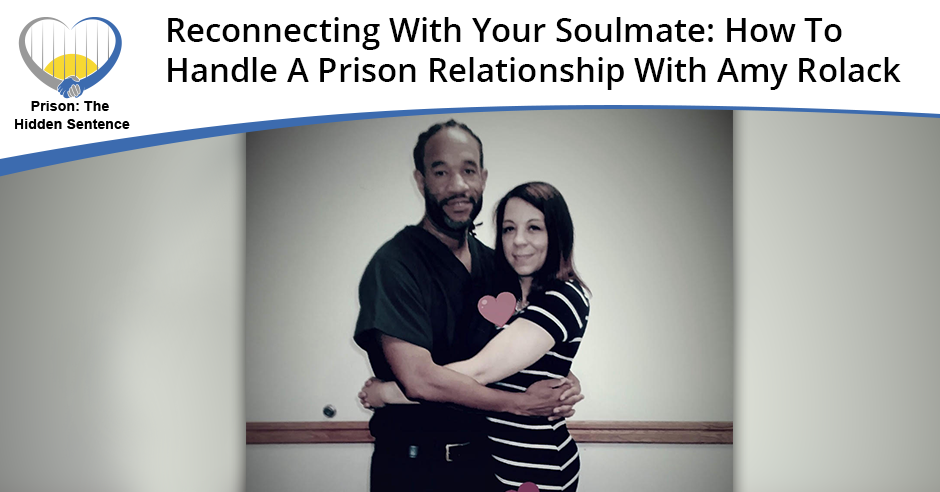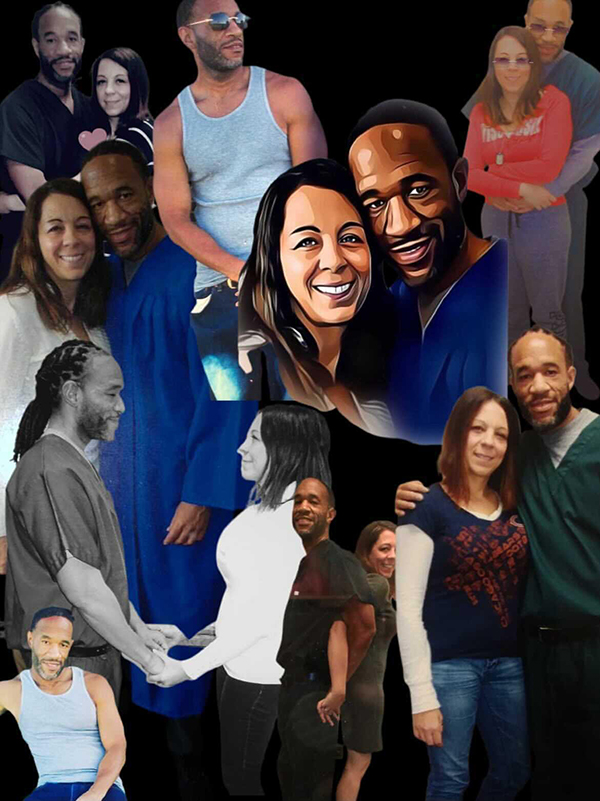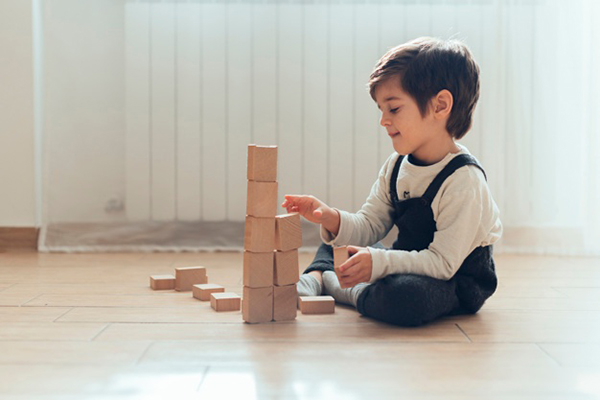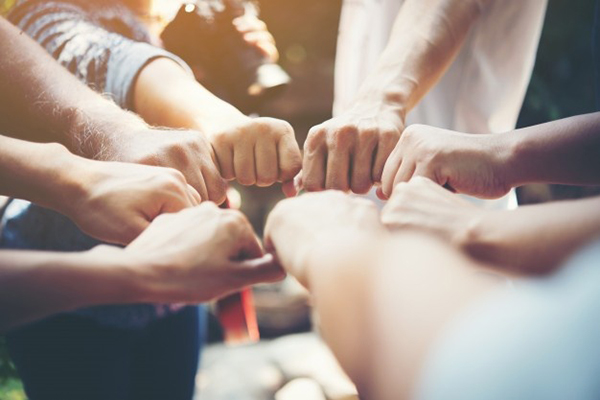
What would you do if your loved one was incarcerated? Would you leave or stay? Amy Rolack did both. When her childhood sweetheart got incarcerated, she broke off the relationship. After ten long years, she reached back out to him, and now they are married. Join your host Julia Lazareck and her guest Amy Rolack as they talk about what it’s like to have a prison relationship. Discover how Amy coped with this struggle and how she is supporting her husband today. Discover what prison visits are like during the pandemic and how they have found ways to keep the prison family together.
—
Listen to the podcast here:
Reconnecting With Your Soulmate: How To Handle A Prison Relationship With Amy Rolack
I want to tell you about the Prison: The Hidden Sentence book. There are many things that you need to know when a loved one is taken to the prison system that nobody tells you. This book will provide valuable information to help you as you go through the stages of the prison system with your loved one. I also share stories, so you know that you’re not going through this alone. Prison: The Hidden Sentence book can be purchased on Amazon.
—
I’m here with Amy Rolack from Wisconsin. Amy is a mother, wife and advocate for her husband who’s been incarcerated since 2005. She shares with us the hardships of being a wife of somebody that’s incarcerated. Amy, thank you so much for being here and sharing your story.
Thank you for having me.
We appreciate it. I know it was several years ago. However, when you receive that call from your loved one, what did you do and how did you feel?
I was upset and distraught. He had been in some trouble so it was also expected that the call was going to happen. I remember the weekend that came. I drove four and a half hours to go see him through a video for 30 minutes, just to continue to try to keep that connection. Also, to get an understanding to figure out where we were going to go from there at that point.
Did you guys hire an attorney or go with a public defender. How was that?
At that time, he had hired an attorney. We went through the courts. It’s crazy because he was given an offer. I thought a year and a half was too long versus what he was looking at because I figured he would win the case. That had been my hope. Unfortunately, that backfired. He should have taken the offer but he had listened to me. He got the extensive amount of time that he got because he took it to trial.
You never know what to do, especially when you think that the offer does not fit the crime. It’s nobody’s fault because it’s an unknown. Nobody knows what to do if you’ve never been through it. You guys did what you thought was best at the time. What was it like when you went to court and did the trial? I know for me, it was probably one of the most traumatic things I’d been through.
It was traumatic. At the end of the hearing, the jury deliberates. I remember coming back. It was late at night when they came back. The judge didn’t call it for the day. We were back up in the courtroom at 8:15 PM that night to hear this verdict. My heart sunk. I was in tears. You can’t embrace each other. You’re like, “It’s starting. Here it is. This is his fate as far as plea versus taking it to trial.” It was heartbreaking and devastating.
Not being able to see your loved one is a void that can never be filled because they are the missing piece. Share on XWere you able to tell anybody or did you have any support?
I was a lot younger back then. I had friends that now we’re all on different paths in life, which is fine. They all knew about it. They all knew him. It wasn’t like this was somebody that I had just introduced them to. They all knew who he was. They were supportive. We did a lot of getting together and hanging out. I was in my twenties then and life was a lot different than what it is now with the partying and going out. I was trying to cope with where he was at and trying to fill that void by going out with girlfriends. It can never be filled until he gets home because he’s the missing piece.
You have that empty space in your heart. Luckily, you had support and friends. That’s helpful to be able to have that support and people not leaving you. Once he was incarcerated, how far away was he? How did you keep that relationship going?
To be perfectly honest, we kept the relationship going for two years. He was probably about 50 minutes to 1 hour away from me. I was younger and I was honest with myself. I just said, “I can’t do this time with you. I want to live my life.” We parted ways. I didn’t talk to him for ten years. I moved on. I had another relationship, a marriage, two more children.
My marriage ended up not working for other reasons and we reconnected. I reached out because I had requested that he not write to me because I knew how I still felt about him. We didn’t leave mad or angry feelings. It was hurt if anything. He couldn’t believe he had received a letter from me, and that was back in 2017. We’ve been together ever since then. That’s how that happened.
People don’t realize that when somebody is incarcerated, you’re serving the time with them. Even though you were saying that you were young, it might have been a wise decision at that time in your life because there are things that you had to do. Anybody that has somebody that’s incarcerated, you’re serving the time with them. The only difference is you’re on the outside. When you guys reconnected, how far away was he from you? How did you stay in touch with him after that?
He’s 50 minutes away from me. Pre-COVID, the visits were three times a week and once on the weekend, Saturday or Sunday. Visits during the week are for three hours. On Saturday or Sunday, you could pick, it was two hours. Between visits and him calling, we were seeing each other a lot, like as much as possible. That gets expensive too, the gas up there, buying out of the vending machine, paying for the phone calls that are only fifteen minutes long. Paying a fee to pay for the phone calls and addition. It’s an expense but we had been absent from each other for ten years. It was trying to get back. We literally felt like we just picked up from where we left off. It was awesome.
That’s a connection. During that time you were apart, you had some children. How did your children feel and did you ever bring them?
I have brought them to see him a couple of times because, in January of 2021, we got married. It was important for me for them to know who makes mommy laugh, who makes mommy upset sometimes. Sometimes we see mommy crying or giggling. They needed to know because he always asked about them. He always asked how they were doing. It was important for me. They’ve gone up there a few times. We’ve played games like a family We try to block everything out of where you are, and they get snacks up there.
Anytime they want to go to the vending machine, he’s like, “Let them go up to the vending machine.” They get as much candy as they want. They think of it as a big treat day. They enjoy it. They always give them a hug. They know like that’s my mom’s husband, that’s our stepdad. I’ve never forced them to call him dad or anything like that. They know who this important person is in my life. It was important for me and him, for him to be able to meet them.

That’s great that you all have that relationship. It’s so important to keep the prison family together. That’s going to help your kids but also him when he comes home. With COVID, it’s been difficult for a lot of people for over a year where you couldn’t even see each other. How did you stay in touch and have you been able to see him at all?
Before they brought in Zoom visits, it was still just phone calls and emails through Corrlinks. It was like, “This is getting old.” We’re just talking. Sometimes we wouldn’t even have anything to say because we were talking so much throughout the day. He’d always wonder, “Why are you so quiet?” I’m like, “We literally have talked five times and nothing has changed since the last 4 or 5 times that I talked to you.”
I know that it’s an outlet for him to call home because he needs that peace of mind and I get it, but sometimes there’s just nothing to say. Finally, they got it together where they were offering Zoom visits for free. They first started that they were doing it for a half-hour every other week. That changed. It became an hour and it was going to be twice a week. They finally said, “We’re going to approve visits, but they’re just one hour, once a week. You can hug at the beginning and the end, no kissing, and no handholding.”
They cut off the vending machines. They didn’t want anybody getting up to go get stuff out of the vending machines. They’ve slowly worked to change that. People are being able to go get stuff out of vending machines. On top of that, the vending machines were always so empty because it seemed so hard to get anything nowadays because of this pandemic. In-person visits went from 1 hour to 1.5 hours. It’s still no kissing, hug at the beginning and hug at the end.
In a way, you’re lucky because a lot of states still don’t even have any touching. People have to see each other. Especially for the kids, they see each other through that plexiglass. They can’t touch their loved ones. I’m happy for you that you get that hug.
That’s sad. That’s heartbreaking that there are families that can’t do that. I hear families that are starting to get family visits again. I wish Wisconsin offered family visits but they don’t.
Hopefully, soon everything will open up. It’s hard on the outside and on the inside, especially for people who haven’t seen their loved ones in over a year. I can’t even imagine what it would be like. My heart goes out to everybody that hasn’t been able to see their loved ones in so long.
It had been sixteen months before I was able to go back up there and see him in person.
Was there anything that you guys did to keep the communication going? Some people will read the same books and talk about the books or do different things. Was there anything that you can share that helped you keep the communication going?
When your loved one is incarcerated, you're basically serving the time with them. The only difference is you're outside. Share on XWe did read a book. We read The Five Love Languages. I bought that on Amazon and sent him a copy. We would exchange our thoughts and figure out what page we were on, and talk about it. That was fun. We also read a book called Hope Heals. I don’t know if you’ve ever heard about that. That was touching and based on a true story. It was beautiful. We shared that together too. Other than those books, it’s not a lot. It’s just been the phone.
We started staying away from the emails because there was nothing to say at the end of the night in an email when we’ve talked throughout the day. We send emails here and there, but it’s mainly the phone and when I can get up there to go see him. It’s expensive and he knows that you’re driving an hour for an hour and a half.
I know it’s tough. However, some people would love to be able to drive an hour. Even though it’s difficult and it is expensive, no matter where they are, an hour is doable. We have people here in Nevada that drive 6, 7 hours for an hour. It’s important to see your loved one. Some people that live together don’t talk five times a day. Did they open up the phone calls? Did you have to pay for them during COVID? Were they free?
Nope, they’re not free. They’ve never been free. The only thing that they offered free was the Zoom visits.
Could you see him in Zoom?
Yes.
That’s good because I know for some of the visits when you go to visit somebody in jail, you only see the top of their head because of where are the camera is. It’s nice that with Zoom you got to see him and talk to him like we’re doing now. I know that there’s been a lot of hardships over the years. What were some of the things that made it difficult going through these years with him?
It’s hard because you see the progression. Me for him. The changes that he’s made. The man that he’s become. If you asked him, he’d be perfectly honest. He made mistakes. He wasn’t thinking and didn’t care. He was just out there crazy. He’s like, “I was a boy who walked into these gates. I will walk out a man.” He’s in a peer specialist program where he wants to become a peer specialist. He’s like, “I see all these young guys in here. They’re all about how cool it is to holler and the disrespectful name-calling to each other. The disrespect that comes out of their mouth.” He’s like, “All day long. It’s non-stop.”
He said he broke up a fight that was getting ready to happen in the showers because he sat both of these individuals down and said, “Let’s talk about this. It doesn’t need to go that direction.” To see the progress that he’s made from where he started and to not have that ability to say, “Look at me. I can do this. I’m ready to be back out in society.” To be looked at and say, “You probably are but you got all this time left, and you’re going to do it.”

He said that a few months ago, in the same week, not on the same day, two different social workers came to him and said, “You’re ready. They slammed you on the time that you were given.” They were agreeing with him that he received way too much time for what he did. Now, where he’s at in life, they’ve seen the progression over the years from him. It continues to grow and get better.
That’s an everyday struggle to want him home, to know he would be successful if he got home, to know that he could help the teens out here in Wisconsin that are all about gun violence, gangs and drugs. Even if he could save just one kid here and there, that would mean the world to him. He has it in him because he has the knowledge and the experience from what he went through, and how he was when he was that age.
What you’re saying, it sounds like he’s doing so good, and some of the hardships are that he can’t come home.
When he got sentenced a few years prior to that, Wisconsin passed a law called Truth-in-Sentencing. We used to have parole. You do two-thirds of your time and you could get paroled out. They took that away. Anybody who got sentenced after a certain year was under this Truth-in-Sentencing Law. It’s basically do all your time.
He’s eligible for what they call in Wisconsin, ERP, Early Release Program. Maybe they call it the same thing in other states. He’s fighting with the program lady that reviews it there because he had a drinking problem when he was out in society. He lost a brother because he was an alcoholic a few years ago. He wants to get into an AODA program. She’s like, “It’s not in your record.” He’s like, “I’m telling you. I had a drinking problem. I need help for it.” He’s eligible for that but he has to take this program in order to do that.
He’s only eligible for it either 4 or 5 years from his release date. Granted that’s a blessing if you can cut off 4 or 5 years of your time, but if you’re not going to give him the help that he’s asking for, that’s the unfortunate part. He’s stuck in that position when it comes to that. He’s still trying to progress forward, do everything that he’s supposed to do, be respectful, be mindful, and keep taking it day by day.
Do you think that it’s because he has you on the outside that that’s helping him become a better person to see the light at the end of the tunnel?
He’s absolutely told me that when I came back into his life in 2017. He was at a point at that time where he didn’t care what he did. He ended up in the hole. He ended up passing while he was in there. He didn’t care. He had lost his dad since he’s been in there. His dad was his best friend. To not be able to mourn your dad. You have to put on a certain look when you’re in prison. You don’t want anyone to think you’re weak and all that stuff that he tells me. I would say we’ve made each other stronger.
How has he helped you?
As a couple, help make each other stronger. Share on XHe helps with the kids. He keeps me mindful. Some of the stuff that they do, I feel like I’m easily walked over by them because they’re my babies and I love them. Sometimes, he makes points where he’s right. They shouldn’t do that or they shouldn’t talk like this. He’s been supportive in the job change that I had. Anything that I’m doing out here, we try to talk about. Sometimes there’s not the opportunity as a lot of people know because I don’t get to pick up the phone to ask him or talk to him. I make decisions and he’s always supported my decisions. Sometimes even if he doesn’t like it, we talk about it but he still supports it.
No matter where he is, he’s still a part of the family. He’s still a part of the decisions. He’s a part of your family. You can do that. You can keep people together. You’re a prime example of keeping your family together of having your husband who is incarcerated. That is just wonderful that you’re able to do that. I know a lot of people might find that hard to understand but it doesn’t matter where somebody is when you love them. You want them to be a part of your life and they can be. He’s even helped with the kids. I commend him and you. That is just wonderful that you can keep that going. I know it’s still quite a while away and I hope things open up soon. When are you going to see him again?
I’m hoping on weekend, Sunday. It’s harder during the week with the kids back in school. It gets dark so much earlier. I’m not a big fan of driving in the dark. I’ve never been. He understands that. Probably on Sunday, in the morning when I can take a drive, have time to myself, have my cup of coffee and prepare. It’s like going on a date like, “What do I wear? How should I do my makeup?” It’s something new every time you go, for me. I know there are a lot of other women that are the same way. It’s like a date. How do you do your makeup? How should I wear my hair? What outfit should I put on? Is this outfit going to be okay to wear when I get in there? I have a backup outfit in the car. Either way, I’ll be good.
We all have a backup outfit because you never know. That’s smart. That’s good advice. We give that to everybody when they go to visit. What are you looking forward to when you see him?
Just seeing him. He always says he loves to see me smile and I’m the same. I love to see him smile. He’s in such a place where, how do you bring happiness out of that. He says that it’s like a breath of fresh air when he sees me because he’s out of that environment. He gets to come and see me, and it’s one-on-one conversations, and the way we laugh and joke together. I love him so much. I’ve always thought he was my soulmate. I met him in 2005 and it didn’t work. I wasn’t ready. I’ve totally matured since then. I can do this. It’s great that we were able to reconnect. Now, we’re husband and wife. That’s still mind-boggling to me.
When my brother was first incarcerated, the first time we went to visit him, there was a wedding. My parents and I were like, “This is crazy. Why would anybody want to get married?” With everything that I know, I know how important it is for people. Love is love. To be able to marry the person that you love, it’s wonderful that you’re able to do that. You can keep that relationship. You can talk on the phone. You can write. You can see each other.
Hopefully, soon it will open up and this pandemic goes away. It’s nice that in Wisconsin you can give a hug, have that personal touch, and be able to touch somebody. All these people that are incarcerated that haven’t been able to receive love or touch from a loved one in many months, it must be so difficult. I’m happy that in Wisconsin that you’re able to do that.
That is heartbreaking when you say it like that. There are many individuals that that one hug would mean the difference to somebody. It’s heartbreaking the way the system across the board is in general. I want to be that voice and try to be able to make some type of change for the better if I can. I want to be able to do it.
Just talking here, having people learn about you, and knowing what’s going on in Wisconsin, there’s so much we can do by raising awareness and letting people know what’s going on. Everybody needs a human touch. We’re human. We need that. You’ve been through a lot. It’s been several years. You’ve got several more years to go and we’ll stay in touch and support you on your journey.
Thank you, I appreciate that.

You’ve been coming to the Prison Families Alliance meetings and speaking to other people. Getting support is important. What has helped you the most getting through these years since you guys reconnected?
I’d say the support, definitely. The relationships that I’ve made through meeting other people through different support groups have been phenomenal. Some of those women I stay in touch with on a weekly or monthly basis. To know you can pick up the phone to vent. They get it. There’s no judgment. The biggest thing is to find as many support groups, systems or people that you can find because this is a tough journey.
I’m looking forward to the day when he comes home, so we can tell our testimony. I want to still be that support person for anybody. It doesn’t stop when he gets home. We’re going to continue to advocate. We’re going to continue to support those who are still in it. We want to still be those voices. It’s huge to have support groups.
That’s what helped me. It’s so important for people to do that. Any last words or any helpful information that you can give to people that are out there?
From my end, as far as being a prison wife, I’m sure it’s different if you have a child who’s incarcerated. On the end of a prison wife, it’s about being there. Understanding the good days and the bad days. There seem to be more bad days than good days because we don’t know what they’re going through in there, just like they don’t know what we’re going through out here, trying to live everyday life, trying to make ends meet, and also trying to support them.
It’s being honest with each other, having those tough conversations, and loving each other through the hard times. Find support groups as many as you can. I’m in maybe 3 or 4 different support groups and all of them have been phenomenal. It’s helped us with having conversations, my husband and I, with each other. Also, being honest is the best policy. Keep that communication open. Pray always, believing and trusting in God. That’s been a hard one for me. There are days that I struggle with that. That’s huge to have the faith, to pray and to know that in the end, it’s going to be all right.
That’s great advice. Good words of wisdom to everybody, especially when you’re going through it and you’re in the middle of it. Thank you for sharing your story. I’m happy that you found your soulmate, that you’re keeping the communication going, that you can see each other, and that you have a healthy family. I will stay in touch. Thank you so much.
Thanks, Julia.
Important Links:
- Prison: The Hidden Sentence
- Amazon – Prison: The Hidden Sentence
- Amy Rolack – Instagram
- The Five Love Languages
- Hope Heals
- Truth-in-Sentencing
- Prison Families Alliance
About Amy Rolack
 Amy Rolack is a wife, a mother of four girls and one grandson. She prays for her husband every day for his safety and for the day that he can come home. Under Wisconsin’s Truth-in-Sentencing laws, any person who commits a felony offense on or after Dec. 31, 1999, and is sentenced to at least one year in prison will not be eligible for parole. She is an advocate for changing this law.
Amy Rolack is a wife, a mother of four girls and one grandson. She prays for her husband every day for his safety and for the day that he can come home. Under Wisconsin’s Truth-in-Sentencing laws, any person who commits a felony offense on or after Dec. 31, 1999, and is sentenced to at least one year in prison will not be eligible for parole. She is an advocate for changing this law.
Love the show? Subscribe, rate, review, and share!
Join the Prison: The Hidden Sentence Community today:

Securtel says
Thank you for sharing Amy. Your story unique and you really love your husband. Happy for both of you now…
GlobalTel says
This is an interesting topic and makes sense to me. Great article, indeed! Life is short, so choose to be loved and loved.
JailAid says
This is a cheesy topic, but I enjoy reading your article. I believe that true love conquers all—cheers to all the inmates who feel the love or find their true love.
Global Tel says
It’s great to read this. Love is a choice between two people. Being away from your loved one is hard, but true love wins.